- Home
- Cecil Beaton
The Parting Years (1963-74)
The Parting Years (1963-74) Read online
THE PARTING YEARS
1963-74
Cecil Beaton’s Diaries
Volume Six
Table of Contents
Foreword to the New Edition
Part I: Home and Away, 1963-4
Part II: The Chosen Ones, 1964-7
Part III: The Younger Generation, 1967
Part IV: Behind the Iron Curtain, 1967
Part V: Hither and Thither, 1968-70
Part VI: South American Idyll, 1971
Part VII: Farewell to Old Friends, 1971-4
ALSO IN THE CECIL BEATON’S MEMOIRS SERIES
Foreword to the New Edition
I welcome the republication of the six volumes of Cecil Beaton’s diaries, which so delighted readers between 1961 and 1978. I don’t know if Cecil himself re-read every word of his manuscript diaries when selecting entries, but I suspect he probably did over a period of time. Some of the handwritten diaries were marked with the bits he wanted transcribed and when it came to the extracts about Greta Garbo, some of the pages were sellotaped closed. Even today, in the library of St John’s College, Cambridge, some of the original diaries are closed from public examination, though to be honest, most of the contents are now out in the open.
The only other person who has read all the manuscript diaries is me. It took me a long time to get through them, partly because his handwriting was so hard to read. I found that if I read one book a day, I had not done enough. If I did two in a day, then I ended up with a splitting headache! This in no way deflected from the enormous enjoyment in reading them.
Altogether there are 145 original manuscript diaries dating from Cecil going up to Cambridge in 1922 until he suffered a serious stroke in 1974. A few fragments of an earlier Harrow diary survive, and there is a final volume between 1978 and 1980, written in his left hand. 56 of these cover his time at Cambridge, some of which appear in The Wandering Years (1961). 22 books cover the war years, and were used for The Years Between (1965), and nine books record his My Fair Lady experiences, some of which appear in The Restless Years (1976) and were the basis for Cecil Beaton’s Fair Lady (1964). These six volumes probably represent about ten per cent of what Cecil Beaton actually wrote.
The diaries attracted a great deal of attention when first published. James Pope-Hennessy wrote of Cecil’s ‘thirst for self-revelation’, adding that the unpublished volumes were surely ‘the chronicle of our age’. Referring to Cecil’s diaries, and those of Eddy Sackville-West, he also commented: ‘We could not be hoisted to posterity on two spikier spikes.’
I have to tell the reader that these volumes were not always quite the same as the originals. Some extracts were rewritten with hindsight, some entries kaleidoscoped and so forth. Certain extracts in these six volumes were slightly retouched in places, in order that Cecil could present his world to the reader exactly as he wished it presented. And none the worse for that.
Hugo Vickers
January 2018
Part I: Home and Away, 1963-4
RETURN TO AN OLD HAUNT
London: December 1963
Visited D. Bryce Smith’s artist’s materials shop in the Hampstead Road, a haunt of my extreme youth. This Euston neighbourhood, once flourishing, in a small Dickensian way, is now in the throes of a huge reconstruction; there are to be overpasses, underpasses, garages and skyscrapers. Meanwhile, little derelict shops are to be pulled down. My old ‘Aladdin’s Cave’ of hot-pressed and rice-paper notebooks still survives, with a lease of ten years to go, but all around is decay. Shades of Eggie Hine at Harrow, my first Diaghilev ballet sketches, and Pavlova drawn on rice-leaf pages. This is where I used to come to get the tools of my trade.
It was depressing to come back. So much was ‘no longer available’. Cox’s rough paper gone; so much that was of quality now superseded. An arty-genteel lady served me in an almost deserted shop in which a few slipshod, makeshift partitions were hiding the living quarters backstage. There were heavy layers of dust on old notebooks on shelves and, on the counter, hideous, garish calendars and gimmicky, trashy gadgets. The arty lady saw I wanted a lot of things but was easily diverted to gossip over the telephone when it rang.
I kept ordering in vast quantities, inspired by the thought that there was much to design in the near future (Traviata, Arabella, the Lerner musical about Chanel). I was refusing to be daunted by the unhelpfulness of the arty lady, or by the difficulty of getting what I really wanted.
I went out hopefully with papers and notebooks under my arm, but hardly with the elation in my heart that I had had when I was twenty.
December 11th, 1963
Exercises at eight o’clock were quite an effort with a hangover. Decided to give up work for the day. Lunch with Patrick Plunket. Highly sophisticated fish food at Wilton’s, served as in a nursery. Jokes, high spirits, followed by tour to Bond Street; strange frantic shoppers; on to crowded David Hockney exhibition. He is undoubtedly an original, and his engravings for Rake’s Progress are beautiful. This Manchester boy with the yellow glasses, yellow dyed hair and exaggerated north-country accent was accosted at vernissage by an irate lady. In a loud voice she challenged him for drawing his nude women in such a distorted manner. ‘Can you really imagine that is the way the arm comes out of the socket? Look at their bosoms — they’re nowhere near where they should be. Have you ever seen a naked woman?’ ‘A dorn’t knogh ars ah harve!’ ‘Well, I’ll tell you the hips are not like that; the entrejamb starts here, not there. The thighs aren’t flat like that, the buttocks aren’t small and squashed and sideways. Don’t you realize that the rib cage runs down to the groin?’ ‘A dorn’t knogh ars ahm unturusted!’
Highly civilized evening with Bertie Abdy. He formed collections for Chester Beatty and for Gulbenkian, and had close connections with Wildenstein. When he bought a Renoir for five thousand francs he was called a ‘milord-imbécile’ in the French press for doing so. He had the first exhibition of Paul Klee, and although the highest price was £14 he did not sell one. An art connoisseur par excellence, but who must make money, he has now fallen on better days, comparatively.
Jane Abdy in black organza from Dior. Best Rothschild wine and food. Felt utterly at ease, loving every rare moment of Bertie’s fascinating stories of the dishonesty of art dealers. Of course Bertie always does the best for himself, and has the whole world of art dealers against him. But they know he has an eye and knowledge, and they are terrified of him.
Fascinating conversation with Edwina d’Erlanger who relishes the luxurious nuances of clocks and Chinese china. Edwina added her experience of nearly being swindled out of £10,000 over a pair of pearl earrings.
December 19th
Brando Brandolini and Cristiana were being entertained at the David Somersets, so not only did I throw myself joyously into the atmosphere of cigar smoke and Dom Perignon gaiety, but after two hours went on to a young beatnik party given by Lucy Lambton for Michael Wishart.
Reddish: December 21st
Crichel came to lunch. The ‘boys’[1] are all elderly men now. Eddie, a lord, cannot and need not work. His taxes make it simpler not to earn. Desmond Shawe-Taylor exploded with rage when I asked if he’d approve of a Traviata country scene taking place in a stable. ‘You can’t write notes in a stable — she’s got to have a desk.’ His eyes shot red flames. I felt unable to concentrate upon Trevor-Roper’s diagnosis of imaginary or non-imaginary pains as I was too busy clearing the table, and with the dining-room reverberating more than I realized, I found myself hard of hearing and sadly missed a lot of the conversation on the subject of Stephen Tennant’s eccentricity and young Julian Jebb’s longing to make the pilgrimage to his house at Wilsford.
An afternoon walk started aimlessly
but gained impetus. It was such a cold afternoon that we had to be brisk. A round, rose-coloured sun was fast sinking, the rolling hills in the distance sweet-pea coloured, the ground beneath one hard as crystal. The pigs were eating the wooden stanchions of their sties. The calves very somnolent; the birds, few left behind, flying off straight to the horizon. Walked over crusty, ploughed fields, over the hill above Broadchalke, then down the avenue of elms where I exerted myself, ‘doing a Queen Mary’, pulling the ivy off the trunks, a miniscule contribution but utterly absorbing. Glowing with health I returned to the village where the local children were coming out of the hall having seen Treasure Island. I went to the church to look at the chair given in memory of my mother, but found the door locked.
STAYING WITH MICHAEL DUFF AT VAYNOL
Christmas Day, 1963
Mount Snowdon visible — sunny — the wind dropped and temperature mounted.
I remember many nice Christmases here in the past. Fancy dresses, charades, huge breakfast table, present-giving. Juliet Duff, Nora Lindsay, Tilly Losch, Oggie Lynn, Micky Renshaw, etc. Now this year my stomach put a damper on everything. I felt rather appalled at the kilos of kaolin which were not drowning the pains. However, I was lucky to be able to spend most of the day in bed without feeling that I was being a nuisance. There are twenty-eight people in this house, servants included. Everyone giving each other presents makes a mountain of wastepaper. I was bidden to come down for the ceremony. Our names on chairs and tables at appropriate places. Michael’s book on Tutankhamun, and a blue tie from Laura were my nicest presents. Mine weren’t bad to Diana, so appreciative of her Floris. All the children and nannies come down for lunch. Balloons whizzing through the air as they were burst.
The visit of the carollers was a delight, with bishop, accordion player, lanterns, and sheets of music. They made a pretty picture in the stuccoed hall in their red caps and cassocks and white ruffs; men’s hands shrouded in thick gloves. They sang in English, though they are more at home in Welsh, and finished the cycle with ‘Silent Night’. More carols on the television after dinner. We watched and listened to the marvellous sounds coming from King’s College, Cambridge. The faces of these boys are as extraordinarily fine and untrammelled as their voices.
MOUTON
January 1964
To defile, even by lying against them, the exquisitely embroidered linen pillows, was the greatest luxury. My bedroom, the Persian room, was small but comfortable. There were baskets by the bedside with sharpened pencils and rulers. There was a half-bottle of whisky, with a half-bottle of Perrier and ice in case one needed a refresher. On the rim of the bath there was a frilled lamp by which one could read, and a row of Floris scents, violet, gardenia, etc. The linen was impeccable. Every detail perfection in its finish. Pauline Rothschild, alone, could have arranged the still-life of bottles, the pots of green plants, and the white hyacinths.
It appears that to run this house in this prodigious way takes Pauline one and three-quarters to two hours each day; she has an immediate post-mortem with the chef as soon as possible after every meal. Pauline is someone of fable, entirely dedicated to the arts but with her head sufficiently balanced to know exactly how she can achieve this dream.
Dinner was the best of all, as Philippe agreed — moule soup (flavoured with curry) in small Russian cups, flaming quails, pâté de foie — the best, pinkest and freshest — and a sorbet, or lemon ice-cream, of a cornflour texture with the slightest suggestion of lemon rind. Perfection! As for the wines, Cyril Connolly remembers that they were historic. He lifted his glass to his nose and said: ‘We are drinking something that hardly exists anywhere any more. This is very rare.’ He savoured the wine to the full.
Cyril has a reputation for being a glutton. But this is not fair. He did not overeat this weekend. He knows when it is time to say ‘no more’. He is too much of an artist to gorge himself and there is something very appealing and touching about his restraint.
He likes food perhaps more than anyone I know, but that is rather another mark in his favour. Good food does not necessarily have to be rich. I asked Deirdre Connolly if she cooked well. Cyril, most loyal, in front of the Rothschild panoply, interpolated: ‘Yes, very. She makes me the most delicious dinners and often brings them in on a tray in front of the fire. There is a wonderful fish shop in Seaford, an excellent fruiterer in Eastbourne, and a marvellous butcher that we motor over to in Lewes....’
Then completely unsnobbish, Cyril brought out a present for Philippe. From a crumpled brown paper-bag he produced some Cox’s Orange Pippins. He shook them against his ear to hear if they rattled. ‘Yes, they’re ripe. Try this one. There’s a very good fruit shop at Victoria Station.’
January 14th
My sixtieth birthday. Pleasant, quiet morning; no particular pain at such a ruthless reminder that I’m getting old. I don’t mind the closer proximity to death, but I hate the degeneration in mind and body. The spirit is as young as it was, but it’s sad that I don’t seem to develop.
February 9th
Simon Fleet had arranged a pub crawl of the East End, a dozen of us in three cars; a Chinese restaurant; only faintly amusing décor in the pubs; amazing to see the prosperity of the dockers, all well dressed, wearing starched collars and blue suits. The beat-look out. Dancing the Shake; no one minding anything or anybody.
The real thrill was seeing the Christopher Wren house at midnight on Cardinal’s Wharf. This exquisite tall grey-stone house looks on to a miraculous view of the river, with barges beached at low ride and hazy St Paul’s in the distance. The monochrome scene of liquid lights, black cranes, silver and mist, was unbelievably mysterious and romantic.
A pity I see so little of this part of London which has a historical grandeur completely lacking in the bourgeois prettiness of Kensington.
ST MORITZ
March 1st
The first days were a bit of an anxiety. Although the chalet is enormous, with an army of servants to attend one’s every wish, the life is foreign to one’s own. The ways had to be learnt. Others were so expert at them that I felt a bit like a new boy at boarding school.
There was a slight feeling of impending doom, no doubt exaggerated by the climate. The mountains were enveloped in mist, the snow very patchy.
The fact that the sun was hidden in the clouds robbed the place of much of its charm. To begin with I wondered if I would be able to stick a week of this, then suddenly the sun came out. All was changed under a blue sky. The newly fallen snow was crisp. One’s spirits rose, morbidity vanished. The routine of easy living enveloped one completely.
It is only after several days that one realizes how healthy the life is. There is the temptation to drink too much, yet the air is doing its good work all the time. By degrees one feels that the lack of responsibility, and the inability to write even a letter, is all part of a cure that will benefit one later.
The laughs, the wit, the gaiety and the parties are entertaining, the luxury extraordinary. There is everything, yet there is something missing, and that is a basic simplicity. Also I feel the need of someone to talk to with whom I have more in common.
Frivolity is fine. I am good at throwing in the witty phrase, at getting a laugh. I enjoy developing this, and it amazes me sometimes how glib and expert my facility is. But I have always felt the need of a guy-rope, someone who can help me retain some discipline, who can perhaps enjoy some of the frivolities but who will help me to stop short as soon as they become too suffocating.
March 2nd
My friend, Lilia Ralli, was staying nearby. She talked of Charles Bestigui’s eccentricity. Whatever the cause, he gives his old friends hell. His smart acquaintances now leave him to his crotchety vagaries. It seems that recently Ode de Munn’s dog, Capucine, died. Charles hated the dog yet built it a Nelson’s column memorial in the park at Groussay. Ode, appalled by such hypocrisy, wanted her dog buried in her own garden, so she sent a boot box filled with trash for Charles to inter at the base of the column.
Charles is now selling up the Palazzo Labia (he could well afford to give it as a great gesture to the city of Venice) and is building more and more in the park at Groussay which, with Danish gazebo, Chinese bridge and Portuguese pavilions, resembles the World’s Fair.
Now that he cannot walk, he is determined that his friends shall also ride in hand carriages, and so he employs beplumed and titivated negro boys to do the pushing.
AUDREY HEPBURN
Leaving St Moritz for Lucerne
The day of our departure was bright. The scenery from the train windows was very beautiful as the pine trees, freshly cushioned with snow, passed in a pageant of silver, white and black. The crystal lights on the new-fallen snow added an extra texture. The mountains were spiky and hard against the blue sky. The train circled down, until eventually there was no more snow and in the orchards the labourers were pruning the fruit trees, leaving a bird’s nest of branches beneath each tree trunk. What satisfaction in six months’ time when they come home late in the evening with their carts piled high with the fruit.
The mood of slight foreboding that I am apt to feel in high mountains, and certainly experienced on the dark, cloudy days in St Moritz, gave way to one of joy and freedom on arrival in Lucerne. Medieval and eighteenth-century buildings clustered at the edge of Lake Lucerne, interspersed with avenues of pollarded trees; long bridges spanned the water. Here were dozens of church steeples, tall and more pointed than usual, and here were real shops with real books and Picasso postcards, and the best linen and watches. Audrey and Mel Ferrer were in good spirits: ‘We’ll be there with bells on,’ Audrey had said, and they were. They took me to a tea house where the people behind the counter were happy to serve us; where we met with the solicitude that has been a feature since the Kaiser came here at the end of last century but which has been missing in other parts of the world.

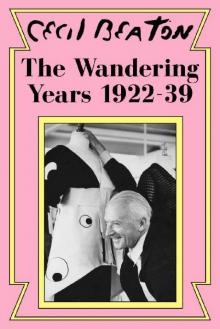 The Wandering Years (1922-39)
The Wandering Years (1922-39)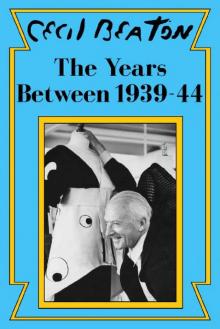 The Years Between (1939-44)
The Years Between (1939-44)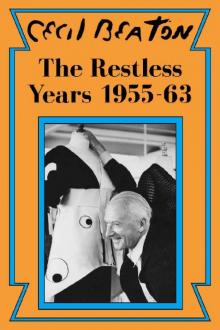 The Restless Years (1955-63)
The Restless Years (1955-63)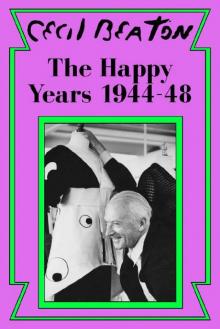 The Happy Years (1944-48)
The Happy Years (1944-48)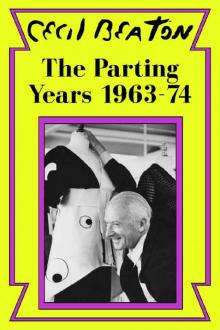 The Parting Years (1963-74)
The Parting Years (1963-74)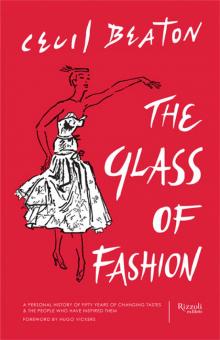 The Glass of Fashion
The Glass of Fashion